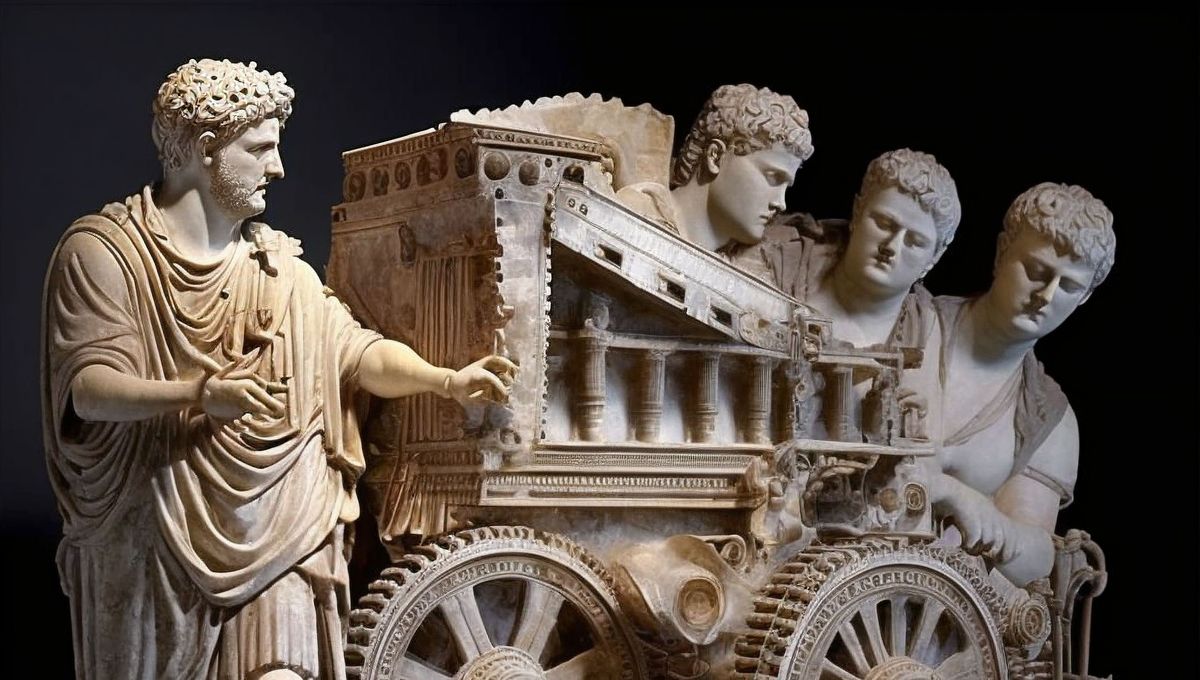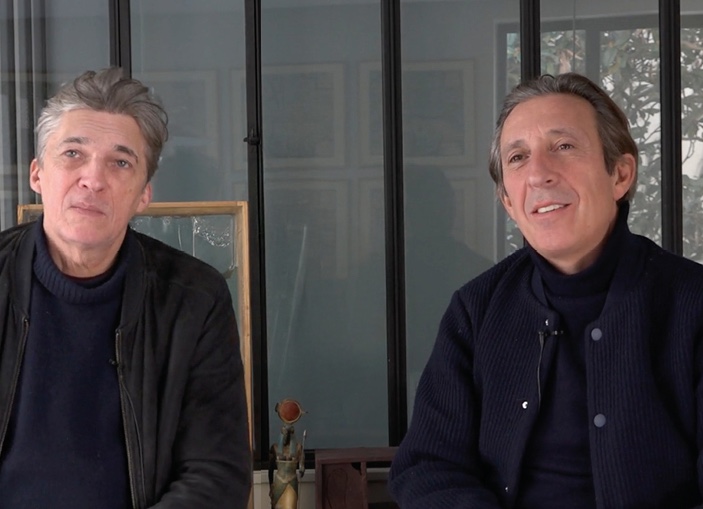Using AI to tell history — podcast transcription

- Publish On 30 January 2025
- Raphaël Doan
- 20 minutes
Read our discussion on the subject of generative AI with Raphaël Doan, a specialist in the sciences of Antiquity and author of the uchronia Si Rome n’avait pas chuté (If Rome hadn’t fallen), an essay imagining, with the help of AI, what might have happened if the Industrial Revolution had taken place under the Roman Empire. Through this experiment, fascinating possibilities for historical and archaeological research are outlined, as AI facilitates the processing of archives, the translation of lost languages and the deciphering of burnt texts.
Stream Voices: In recent years, there has been a lot of media hype around generative artificial intelligence. You have probably all heard of Chat GPT, an AI that generates text and is able to answer questions. You have also probably heard of Midjourney, an AI that generates images by responding to written instructions or guided by reference images. This tool, because that is what it is all about, opens countless perspectives in the fields of administration, coding, medicine or even research. As we will see in this interview with Raphaël Doan, a teacher of classical literature and specialist in sciences of the Antiquity, who is passionate about new technologies. He led the rather crazy experience of co-writing a book with artificial intelligence: a book with a very particular status. It is an uchronia imagining the 19th century under the reign of the Roman Empire called If Rome hadn’t fallen and published in 2023 by Passé Composé editions.
The book is part of my interest in artificial intelligence. At first, I had written several traditional history books before and then I said to myself I was so fascinated by the great models of language. It was before Chat GPT, that was. I had discovered Chat GPT three. Originally, I thought it was a really crazy tool because it was the first time that we could have text that was generated by something other than a human being. And I thought it would be fun to make a book with it. And as one of the main problems, it is that these machines cannot, in their current state, give true information, especially when we are going to add a few historical details to the prompt. This is quite annoying when you want to write a history book, which is my specialty, with a tool that tells you anything you want and that can say false things.
So the uchronia was established quite quickly in fact, because of the advantage that precisely, if the things that the machine told me did not happen, it was not a problem. And so I could actually use this defect as an asset for creation. An uchronia is a literary genre that involves imagining what would have happened in history if an event had been different and imagining the consequences of that change to make a kind of parallel reality or parallel history book. It’s a fairly old genre and has been used a lot. We are simply trying to imagine an alternative story. That is really the principle.
And so there are a lot of examples: what if the Nazis had won the war? What if Napoleon had won Waterloo? What of the Roman Empire? And it turns out that, in the first century after Jesus Christ, there was a Greek inventor who lived in Alexandria, who invented a kind of somewhat gimmicky prototype of a steam engine, which was of little use because it was not powerful enough. And so the idea of the book was to start from this event that really existed and to ask ourselves what would have happened if the machine had been a little more powerful, if we realized what we could do with it, and therefore to imagine that the machine brought before the emperor Nero, who was the Roman emperor of the time, could actually trigger the industrial revolution. So instead of seeing it in the 18th century, we have it in the 1st century after Jesus Christ.
What is also interesting is to study wha the consequences on Roman society could be, by drawing a parallel between our society and the Roman Empire. It echoes to what we are doing as historians. When we try to know, for example, why the First World War broke out, we also ask ourselves, in fact, always implicitly: could it not have broken out? Were there other branch lines? If such an event had changed, there would have been no world war: that’s what we’re asking ourselves in a negative way. And in fact, in the end, it is a bit like a permanent mirror of what the historian seeks to do. When we try to explain the causes of a phenomenon, we are also in fact trying to find out if it could not have happened.
The book divided in chapters that each have two parts. First, a beginning that is fictional, and mostly written by artificial intelligence. And then a second chapter, which was not written at all by one. It allowed me to develop thoughts on the history of technology and Roman history. And I wanted the fictional that AI imagined to be still quite raw, as a direct result of AI. Not putting too much of myself into it, even if in fact, obviously, we are obliged to inject something into it because only by selecting what we have, what we wanted to ask for, what we remember as a generation. But I wanted the style, for example, to be a bit like the standard style of the language model in question, which is not necessarily the most refined or the most pleasant. But I also wanted it to be a kind of testimony of where we are, where we were, and let it serve as a springboard for reflection for the future. That was how I understood it.
Stream Voices: In this back and forth between artificial writing and critical and informed analysis on the part of the historian, the question of selection and scientific coherence arises.
Of the limits that I saw immediately, it was rather the likelihood, let’s say the plausibility of what AI imagines. The things that did not happen but that are plausible and could have happened. Others, on the other hand, seemed totally. It’s on this aspect that I discriminated a bit. You can see the limits. First, it tends to stick to what happened in history in the 19th century: the industrial revolution often takes over the Roman part. But we can’t really blame AI for that because it is quite a difficult exercise. AI is asked to make a mixture of the two, it tries its best to do a mixture of the two. And in addition, would the things that could have happened be necessarily different from reality? From the moment that we imagine that there was a real steam engine that works in Rome, does it not immediately cause, in fact, the development of railways? And then all the consequences of the railway, the acceleration of communications and maybe political changes? It could be similar the ones Europe experienced much later. So it’s a kind of limit, but at the same time not necessarily so absurd either, at least not so annoying. And besides, can we blame AI for not having released something that does not exist?
We were talking about forgers, they are pastiche makers, whether for the image or for the text. Pastiche for me is not a despicable literary genre, it is rather useful. Proust did a lot of pastiche. It’s both a training job for writers, but even in itself, I think it’s an interesting job, because it allows you to try to identify what makes up a style, what makes up a philosophy, what makes up a way of seeing the world and trying to approach it. I think it’s a great way, a great approach.
Image synthesis models are what makes it possible to most closely relate to the artistic creations of past centuries. If we had used them even in Midjourney with a somewhat standard subscription, if we use these words for the prompt : “Greek Greco-Roman statue, 5th century BC, vintage copy, British Museum, marble”, we will have enough keywords to really focus on the images in museum catalogs. And there are still a lot of them, so that’s enough to go towards something quite probable, because we have photos now, of all these artifacts. If you want to go even further, of course, you must do some fine tuning, and therefore model customization, which trains the model on a smaller body of images. Now, that would give something really, very faithful, quite faithful to this style and to this aesthetic.
Stream Voices: In addition to asking artificial intelligence about a rewritten version of history to generate the texts for your book, you asked AI to illustrate it and to produce, in the most realistic way possible, images illustrating the traces of what history could have left, such as statues, portraits, frescoes or other artistic pastiches made obviously in the ancient style.
I wanted to create photos from museum catalogs but add some modern objects or fake computers, to make it look like the ones that are preserved in the British Museum or in the Louvre. Then I wanted to try to make frescoes and mosaics, mainly Roman-style pastiches. That’s a bit harder and the tools that exist today would make it even better. It also works if you find the right inspirations and use a lot of iconographic data. You can also do fine tuning; model customization and you can reach a peak. And then afterwards, I had fun making more cinematographic images to try to get like movie shots from this era. It’s just fun because, strangely, even basic models know what the traits of Emperor Nero are. There are enough images of Nero from the busts that were made at the time. Then all the reproductions. This means that even if you ask for a cinematographic snapshot of a scene where Nero is present, you recognize Nero. And it’s almost moving to think that this person who had particular traits was popping up very continuously in Midjourney in 2024. That’s why I like history.
The idea of time travel fascinates me. I would like to know what it was like to be in Rome, or in Paris in the 8th century. I would love to know what it was like to be someone at that time, because everything was different. It’s the ultimate travel experience. If we travel to a foreign country today, we still find so many things from our life that we already know because it is the same era, especially today with the means of communication that we have. Exoticism is never total, even if you go to the other side of the world, it will never really be that different. But going back three centuries, is no longer the same world. All aesthetic codes have changed, all moral codes have changed. So for me, that’s the ultimate goal, in fact, to try to reproduce history. We know that physically we won’t be able to make a time machine, but I want to try to get as close as possible to it. It’s something that fascinates me and I don’t see a better technology today than video game technology to do that. Because it is the simulation of a world in an interactive way that is as visually realistic as possible. And there will be no other medium that will do that better.
Stream Voices: you are therefore interested in video games and seek to offer historical and immersive experiences with the help of AI.
The idea is to experience history as realistically as possible. Some video games have already done it quite well, but always from a slightly different angle. There is a game called Assassin’s Creed, a game that is well known in France, which offers historical reconstructions, but it’s still an action game first and foremost. So, the focus is not necessarily on historical discovery.
Our idea was really to do a series of simulations whose sole purpose, in quotation marks, is to create a kind of “time machine”. A bit like airplane flight simulators or tractor flight simulators, they exist, and they work very well. Now, the idea is to simulate medieval or roman times, that kind of thing. We use AI because it makes it possible to speed up the work to produce certain parts of the experience. But it’s not necessarily the center either. In general, I think that there are products like the book I made which put AI at the core of the experience, but there are plenty of cases where obviously AI will be just one tool among others that will be used in coordination with others. And for video games, this is very clearly the case, but in a lot of areas, it will also be the same.
Just as it is possible to bring Nero’s face back to life from the mass of information on the Internet. You had fun bringing out Napoleon’s thoughts by training an AI on transcripts of speeches proclaimed by the emperor. To do this, you taught the tool to respond in Napoleon’s manner. A fun experiment but one that opens up perspectives on the contributions of AI in the field of historical research.
The problem is that it’s something that works better for the style than the context. So we can have something that’s going to sound like speeches Napoleon did and we made sure that they also tried to make references to real events. That’s the funny thing, that whatever the subject was, AI Napoleon was going to try to tie it back to his own themes, his own point of view. Even if we asked questions about Mbappé or about smoothies, AI Napoleon was going to try to fit in Austerlitz or Waterloo in the conversation and try to show there was a connection between the two. It was quite fun to experiment with it, but it was not really like having an AI that could answer exactly what Napoleon would have thought. It’s more like creating a AI that speaks as Napoleon would speak.
And that’s something that’s quite interesting because now we’re starting to have tools that can search in large databases, and we are able to get information from them with a lot more certainty than what we could do before. So at the end of the day, if we had to do that again now, we would actually have as many texts as possible on Napoleon’s life, biographies and history, using a system called augmented generation, that is to say text generation that is increased by the search and retrieval of information in a given corpus. Therefore, before answering the question, the AI will first research among a set of sources in order to then derive the relevant information. The question is also to ensure that there is not only the ability to dive into the sources and isolate just a short paragraph to get the information we want, but that AI also knows the “big picture” so that it can also understand the context. And all this would still allow, in the long run, I think, to have ways for historians in particular to interact with their sources in a drastically new way.
So I don’t think AI will replace anything, I think that it is just going to be added to the tools we already have, especially for recent periods of history. In ancient history, in the field that I know a little better, we are not really lost in the sources because we do not have much to work with. So it’s never a problem to look for a source, it’s more finding the source that’s the problem. For a historian of the Second World War, for example, there may be too many archives, and that’s even worse. So being able to search semantically with keywords can play on the meaning itself, even if the word does not appear in the data, or to relate it to other passages, other places, sources that we would not necessarily have seen by hand. That’s really promising.
There’s also another interesting aspect of using AI in history, and that’s making sources, that weren’t available before, decipherable. There are two examples that are worth considering. First of all, there is work carried out by medievalists on the archives of Notre Dame. All the archives of the administration of the cathedral in the Middle Ages and therefore manuscripts that are difficult to read for the neophyte, obviously, but also for a medievalist historian. It’s a fairly long job to copy, transcribe and then translate! They launched a program to scan from manuscripts and then automatically transcribe everything that was written on them thanks to AI. This is extremely useful because there are not many medievalists capable of doing this kind of job, so it would have required a lot of work for a few doctoral students, for example, maybe years to do something that can be done in a few hours, a few days by AI. It thus makes it possible to identify sources that would have previously remained buried due to lack of manpower.
There is another interesting project, called the Vesuvius Challenge, which was done by an American entrepreneur called Nate Friedman and who was passionate about Roman antiquity and who realized that we had some papyrus rolls, that had been charred by the eruption of Vesuvius in Pompeii, Herculaneum and that we couldn’t read, as they are 2000 years old charred papyri. He launched a competition to try to decipher the papyri, using very accurate 3D scans that can model all the layers of the papyrus. To do so, it is necessary to isolate the letters written in ink, which are written on layers that are wound on top of each other: it was not easy, but they succeeded in translating the first texts with it! Thanks to this technology, we discovered a minor epicurean philosopher: this was a testimony of ancient literature we thought was gone! Sometimes we didn’t even suspect the existence of a source before it was discovered. And there are hundreds of manuscripts, ideas like that, that we will probably be able to decode entirely in the coming years. Then you have to get these AI tools to work. And so these are really sources that appear out of nowhere. That’s exciting!
Stream Voices: As a magistrate accustomed to using artificial intelligence, you were interviewed by the Senate’s Foresight Delegation, which sought to glimpse the potential of AIs in the public administration sector
It was basically an introduction to the impact that language models and others can have on public action in general: I had to demonstrate the abilities of language models to senators who, for the most part, did not use them at all. It’s always fun because, for people who’ve never used it, it’s still quite impressive. You see the limits when you start using it a lot, but at first it always seems fascinating.
So we discussed how public authorities can use AI tools: there are a lot of ways to use it I think, because a large part of the action of the State and the administrations is to create text, to analyze text, to modify text. The law is a text. We could compare law to a code, a kind of algorithm on how society works. But in practice, we’ve realized that it’s not the best comparison because the law is always too vague and the reality is always too bizarre, always too varied for us to really have a kind of determinism of application. Couldn’t we have a classical algorithm that applies the law as it is? On the other hand, language models make it possible to have an interface with everyday language. And we use language to create laws. But does that mean that, all of a sudden, we can generate legal texts?
One of the subjects we learn at the ENA (National School of Administration) is legistics. It is a discipline that consists in writing or writing texts of laws and therefore decrees, regulations, laws. And it is not at all impossible that we will one day have good language models that can make good legistics. However, there is also the whole aspect of interpretation to make the law more accessible to citizens. I really think there are a lot of use cases for language models, because everyday language and text really are the ultimate interface of our society and our social architecture. So I am convinced that we will use it in the end, a lot. But there will be enormous inertia because we are talking about public authorities, and there is always inertia in big organizations, but especially in the public domain. I am quite optimistic, especially since now there is a lot of investment and research on AI. I also think there are tools, areas where you can’t afford to even have a 1% chance that it won’t work. That is not the case with law. In fact, I think that this is precisely an area where even magistrates and lawyers often make mistakes. In fact, the law is often an interpretation, which is showed by the fact that case laws are different from on court to another. So this is proof that this is not a field where we need total rigor as nuclear physics.
Right now, I think these models are not reliable enough. But I think that we will reach a sufficient stage for it to be useful and that it can really change a lot of things in people’s work if we really want it to change society. Finally, if we all want to gain productivity thanks to these tools, they must be everywhere and therefore not cost a lot of money. So it will in fact be necessary for all of this to be optimized as much as possible, carbon footprint included. Obviously, the challenge is also the veracity and reliability of the information and everything. But that, of course, will be the number one objective, research in this field. So, is the question, almost philosophical: do these tools have in themselves the possibility, one day, of achieving total reliability, or in any case sufficient for them to be useful? I think so, once they are combined with other smart architectures. Some people think it will not be possible. I think it will, but It’s really a matter of intuition at this point, but that will be the question.
An interview conducted by Jasmine Léonardon, Head of research and scientific valorization, with Lucie Wix to the sound and Milan Rivet to the editing.




